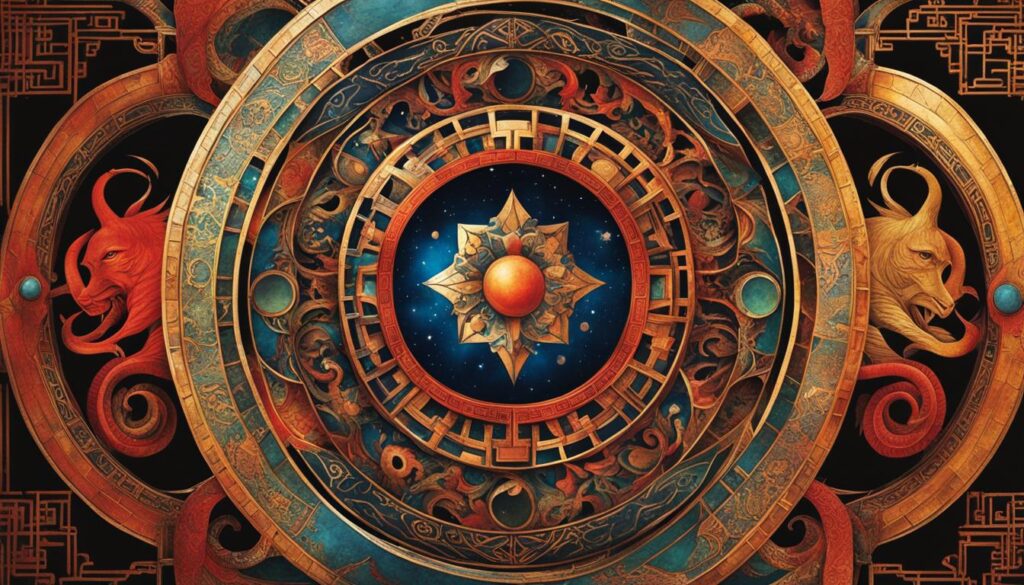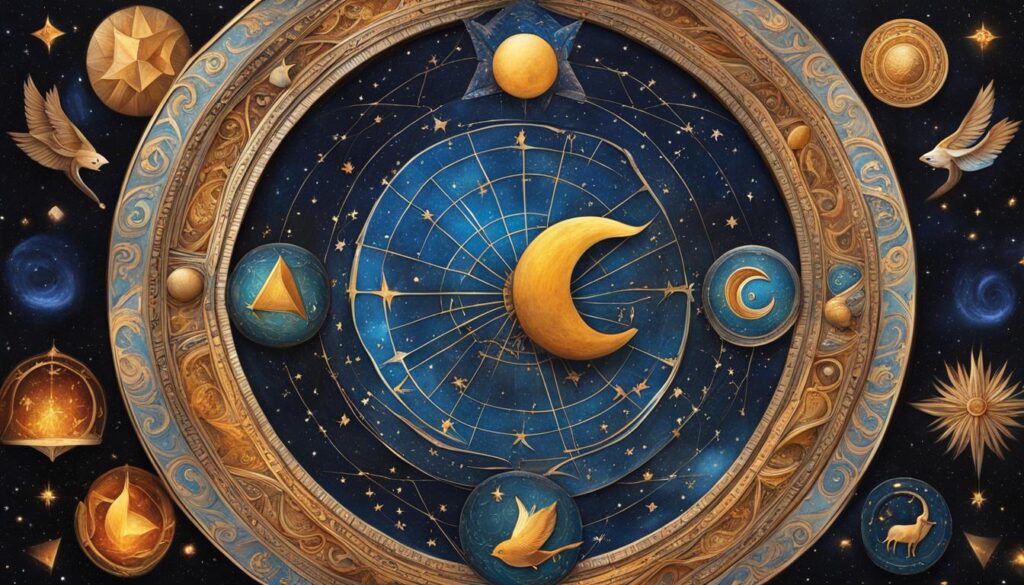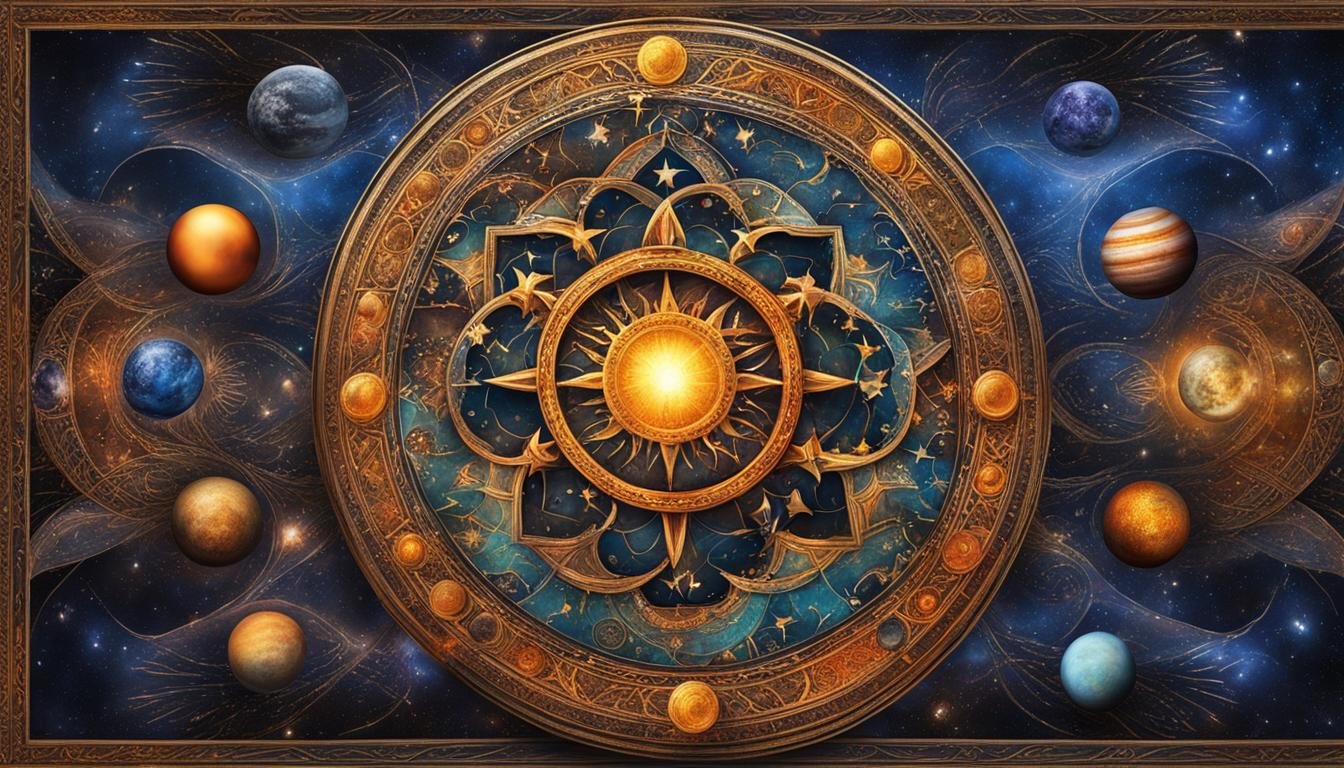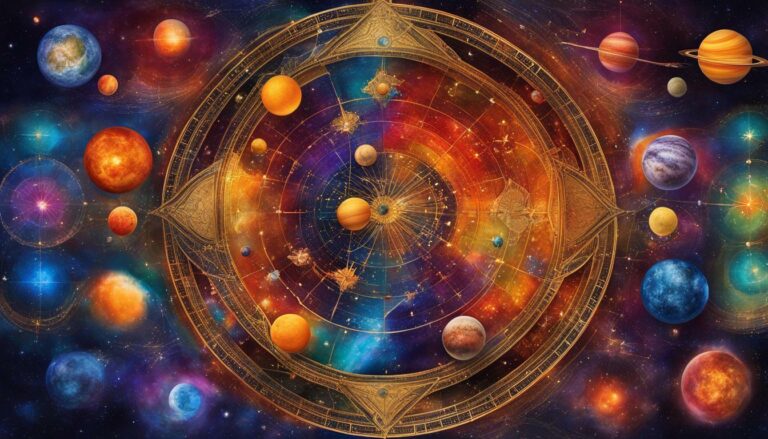What Are the Different Types of Astrology?
Astrology is a fascinating field that encompasses various traditions, types, and systems. It offers insightful perspectives into different aspects of life, from personality traits to relationships and career paths. In this article, we will explore the different types of astrology and dive into their unique characteristics and practices.
Key Takeaways:
- Astrology encompasses various traditions, types, and systems.
- Some of the different types of astrology include Babylonian, Chinese, Hellenistic, Hindu, Islamic, Jewish, Tibetan, and Western astrology.
- Astrology can be divided into branches such as natal astrology, electional astrology, horary astrology, medical astrology, financial astrology, locational astrology, psychological astrology, and meteorological astrology.
- Each branch focuses on a specific aspect of life and offers insights into different areas, such as personality traits, relationships, career, health, and more.
- Exploring the different types of astrology can deepen your understanding of the cosmos and its influence on our lives.
The History and Science of Astrology
Astrology has a fascinating history that spans back to ancient civilizations such as India, Greece, Egypt, Mesopotamia, Rome, and Persia. These cultures integrated astrology into their way of life, recognizing a profound connection between the cosmos and earthly events. Additionally, astrology played a significant role in the development of astronomy, as ancient astrologers made valuable observations about celestial bodies. While astrology is not recognized as a scientific discipline, it has influenced scientific thinking throughout history.
Astrology’s origins can be traced back to ancient times, with texts like the Vedas in India and the Tetrabiblos by Ptolemy in Greece. These texts formed the foundation for the study and practice of astrology and provided a framework for understanding the relationship between celestial bodies and human affairs.
Ancient astrologers observed the movements of the planets and stars, noting their patterns and correlations with events on Earth. They developed intricate systems and techniques to interpret these celestial movements, which eventually evolved into the diverse branches of astrology we have today.
Although astrology and astronomy were once closely intertwined, they eventually diverged. Astronomy became the scientific study of celestial objects, while astrology focused on interpreting their influence on human life and events. While astronomy relies on empirical evidence and the scientific method, astrology is based on symbolic interpretations and personal experiences.
It’s important to note that astrology should not be viewed as a substitute for scientific understanding or predictive accuracy. Instead, astrology offers a unique lens through which to explore our own lives, relationships, and personal growth.
Throughout history, astrology has continued to captivate and intrigue individuals seeking insights into themselves and the world around them. Its enduring popularity is a testament to its ability to tap into our innate fascination with the stars and our desire to find meaning in the cosmos.
Different Traditions and Systems of Astrology
As astrology has evolved over time, it has given rise to unique traditions and systems across different cultures. These diverse traditions offer valuable insights into the connection between celestial bodies and human affairs. Let’s explore some of the major traditions and systems of astrology that have emerged throughout history.
Babylonian Astrology
Babylonian astrology, originating from ancient Mesopotamia, is one of the oldest known astrological traditions. It focused on predicting celestial events and their impact on human lives. Babylonian astrologers used various techniques, such as observing planetary movements and interpreting celestial omens, to make predictions and provide guidance.
Chinese Astrology
Chinese astrology, deeply rooted in Chinese culture, has a rich history dating back thousands of years. It incorporates elements of Taoism, Confucianism, and Buddhism, and is based on the lunar calendar. Chinese astrology consists of twelve animal zodiac signs, each representing a year in a twelve-year cycle. Each sign is believed to possess specific characteristics that influence individuals born under it.
Hellenistic Astrology
Hellenistic astrology developed during the Hellenistic period in ancient Greece and Egypt. It blended Babylonian and Egyptian astrological practices with Greek philosophy. Hellenistic astrologers introduced concepts such as horoscope interpretation, planetary rulership, and aspects, which are still widely used in astrology today.
Hindu Astrology
Hindu astrology, also known as Vedic astrology, is deeply rooted in Indian culture and spirituality. It incorporates the concept of divine karma and aims to provide insights into various aspects of life, including relationships, career, health, and spirituality. Hindu astrology uses the sidereal zodiac, based on the constellations, and takes into account the positions of the planets at the time of birth.
Islamic Astrology
Islamic astrology, also known as Arabic astrology, emerged during the Islamic Golden Age. Islamic astrologers studied both Hellenistic and Indian astrological systems and adapted them to Islamic beliefs. They focused on the use of horary charts, which provide answers to specific questions based on the time a question is asked. Islamic astrology also played a role in the development of astronomy during this period.
Jewish Astrology
Jewish astrology, based on ancient Jewish traditions and texts, provides insights into the connection between the cosmos and Jewish life. It focuses on understanding the influence of planetary movements and celestial events on religious practices, rituals, and daily life. Jewish astrology plays a significant role in determining the most favorable times for religious ceremonies and events.
Tibetan Astrology
Tibetan astrology is deeply rooted in Tibetan Buddhism and is an integral part of Tibetan culture and spirituality. It combines elements of Chinese, Indian, and native Tibetan practices. Tibetan astrologers use lunar astrology, which is based on the phases of the moon, and analyze the positions of the planets to provide guidance on various aspects of life, including health, relationships, and spiritual practices.
Western Astrology
Western astrology, widely practiced in the Western world, is based on the tropical zodiac and focuses on individual birth charts. It encompasses various techniques, such as interpreting the position of planets, astrological aspects, and planetary transits, to gain insights into an individual’s character, relationships, career, and other life areas. Western astrology also includes branches like psychological astrology, which explores the psychological aspects of astrology.
These are just a few examples of the many traditions and systems of astrology that have developed around the world. Each tradition offers unique practices, techniques, and interpretations that shed light on the connection between celestial bodies and human life. Exploring these different traditions can deepen your understanding of astrology and provide valuable insights into yourself and the world around you.

Branches of Astrology
Astrology encompasses various branches that specialize in different aspects of human life. Each branch offers unique insights and focuses on specific areas of interest. Let’s explore the different branches of astrology and their significance.
Natal Astrology
Natal astrology, also known as birth chart astrology, is one of the most popular branches. It involves analyzing individual birth charts to gain insights into personality traits, strengths, weaknesses, and life paths. By examining the positions of celestial bodies at the time of birth, natal astrology provides a deeper understanding of one’s character and life journey.
Electional Astrology
Electional astrology helps individuals find the most auspicious time to initiate an activity or venture. This branch focuses on selecting favorable planetary alignments and energetic influences for specific events. From starting a new business to planning a wedding, electional astrology guides the timing of important decisions to enhance success and harmony.
Horary Astrology
Horary astrology is all about answering specific questions based on the time the question is asked. This branch uses various techniques to interpret celestial positions and determine the outcome of the queried situation. Horary astrology provides direct, precise answers and insights into specific matters, such as relationships, career decisions, or personal dilemmas.
Medical Astrology
Medical astrology delves into the connection between planetary positions and health issues. By examining an individual’s birth chart, medical astrologers identify potential health vulnerabilities and suggest preventative measures. This branch considers the influence of celestial bodies on different organs and offers insights into maintaining physical well-being.
Financial Astrology
Financial astrology analyzes the correlation between planetary movements and economic trends. This branch helps investors and financial professionals make informed decisions by considering astrological indicators. By identifying favorable times for investments and predicting market movements, financial astrology offers unique perspectives on wealth accumulation and financial success.
Locational Astrology
Locational astrology explores the influence of different locations on an individual’s life. By analyzing the planetary positions in different geographical areas, locational astrologers provide insights into the best places for career growth, love and relationships, and personal well-being. This branch helps individuals understand the energetic compatibility between themselves and specific locations.
Psychological Astrology
Psychological astrology focuses on exploring the psychological aspects of an individual’s birth chart. This branch examines the connection between celestial influences and psychological patterns, providing valuable insights into personality traits, behavioral tendencies, and emotional well-being. Psychological astrology promotes self-awareness and personal growth.
Meteorological Astrology
Meteorological astrology, also known as weather astrology, utilizes astrological principles for weather forecasting. This branch examines the relationship between celestial events and weather patterns, offering predictions for meteorological phenomena. By analyzing planetary alignments, meteorological astrologers can provide insights into climate changes, extreme weather conditions, and natural disasters.
By exploring the diverse branches of astrology, you can gain a deeper understanding of yourself, your relationships, and different aspects of life. Whether you’re intrigued by the insights of natal astrology or looking to optimize your financial decisions with financial astrology, each branch offers a unique perspective that can enrich your life.
Astrological Signs and Symbols
Astrology and zodiac signs go hand in hand, as they represent the diverse range of personality traits and characteristics found in individuals. Your zodiac sign is determined by the position of the sun at the time of your birth. There are twelve zodiac signs in total, each with its own unique symbol and significance.
Let’s take a closer look at these astrological signs and symbols:
- Aries: The first sign of the zodiac, symbolized by the ram. Aries individuals are known for their boldness, passion, and independent nature.
- Taurus: Represented by the bull, Taurus is associated with stability, determination, and a strong appreciation for the finer things in life.
- Gemini: The symbol for Gemini is the twins, reflecting their dual nature. Gemini individuals are versatile, curious, and excellent communicators.
- Cancer: Symbolized by the crab, Cancerians are nurturing, intuitive, and deeply connected to their emotions and home.
- Leo: Represented by the lion, Leos are confident, charismatic, and natural-born leaders who love the spotlight.
- Virgo: Symbolized by the maiden, Virgos are detail-oriented, practical, and have a strong desire for perfection.
- Libra: The symbol for Libra is the scales, representing their pursuit of balance, justice, and harmonious relationships.
- Scorpio: Represented by the Scorpion, Scorpios are passionate, intense, and known for their transformative and mysterious nature.
- Sagittarius: Symbolized by the archer, Sagittarians are adventurous, optimistic, and always seeking knowledge and truth.
- Capricorn: The symbol for Capricorn is the mountain goat, reflecting their ambitious, disciplined, and determined nature.
- Aquarius: Represented by the water bearer, Aquarians are known for their individuality, humanitarianism, and intellectual pursuits.
- Pisces: Symbolized by the fish, Pisceans are compassionate, imaginative, and deeply in touch with their emotions and spirituality.
These astrological signs and symbols provide valuable insights into our individual personalities and can be used to guide us through life’s opportunities and challenges. Whether you identify with the fiery nature of Aries, the groundedness of Taurus, or the intellectual curiosity of Gemini, embracing your zodiac sign can help you better understand yourself and others.

Love Astrology and Relationship Compatibility
Love astrology delves into the intricacies of relationships, exploring the compatibility and dynamics between individuals. By comparing the birth charts of two people, synastry astrology seeks to uncover the connection and compatibility shared between them. Similarly, composite astrology combines the birth charts of two individuals to create a single chart representing their relationship.
This branch of astrology offers valuable insights into various aspects of a relationship, including the energy and projection between partners, as well as potential challenges and growth opportunities. By studying love astrology, you can gain a deeper understanding of compatibility, communication styles, emotional connection, and shared goals.
Love astrology holds the power to shed light on the unique dynamics between you and your partner, helping you navigate the intricacies of your relationship. It offers a tool for self-reflection, enabling you to align your actions and decisions with the cosmic energies surrounding your love life. Whether you’re seeking confirmation or guidance, love astrology can provide valuable insights that foster understanding and growth in your relationship.
Vedic Astrology and its Ancient Practices
Vedic astrology, also known as Hindu astrology, is an ancient form of astrology that originated in India. With a history spanning thousands of years, it holds deep roots in Indian culture and spirituality. Vedic astrology follows the sidereal zodiac, which is based on the constellations and takes into account the positions of the planets at the time of birth.
This ancient practice provides profound insights into various aspects of life, including relationships, career, health, and spirituality. Vedic astrologers have gained reputation for their accurate predictions, as they interpret the celestial influences in a birth chart to reveal hidden patterns and potential outcomes.
One of the distinguishing features of Vedic astrology is its emphasis on karmic energies and remedies. Astrologers utilize gemstones, mantras, and rituals to help balance these energies and bring about positive changes in one’s life. By aligning with the cosmic energies, individuals can navigate challenges, enhance their strengths, and attain spiritual growth.
- Based on ancient Vedic scriptures and teachings
- Uses the sidereal zodiac and planetary positions
- Offers insights into relationships, career, health, and spirituality
- Emphasizes karmic energies and remedies
- Utilizes gemstones, mantras, and rituals for balancing energies
Whether you are seeking guidance in your relationships, career, or spiritual journey, Vedic astrology can provide valuable insights and help you navigate life’s challenges. The ancient wisdom embedded in this astrological tradition continues to be cherished and practiced by millions around the world.
Conclusion
Astrology is a fascinating field that offers unique perspectives on human life. With its diverse traditions, systems, and branches, astrology provides valuable insights into personality traits, relationships, and career paths. Whether you’re interested in Western astrology, Vedic astrology, or any other type, exploring the different forms of astrology can deepen your understanding of the cosmos and its influence on our lives.
By using astrology as a tool for self-reflection and personal growth, you can tap into the wisdom of the stars and uncover your true potential. Astrology opens doors to self-discovery and helps you navigate life’s challenges, making it an invaluable resource for self-awareness and empowerment. Embracing astrology allows you to gain a deeper understanding of yourself and the world around you.
So, whether you’re seeking insights into your personality, guidance in relationships, or a new perspective on your career, astrology has something to offer. Its rich history, diverse traditions, and intriguing branches provide endless possibilities for exploration and growth. Uncover the mysteries of the stars and embark on a journey of self-discovery with astrology as your guide.
FAQ
What are the different types of astrology?
The different types of astrology include Babylonian, Chinese, Hellenistic, Hindu, Islamic, Jewish, Tibetan, and Western astrology.
What is the history of astrology?
Astrology has a rich history dating back to ancient civilizations such as India, Greece, Egypt, Mesopotamia, Rome, and Persia. It played a role in the development of astronomy and has influenced scientific thinking.
What are the different traditions and systems of astrology?
The major traditions and systems of astrology include Babylonian, Chinese, Hellenistic, Hindu, Islamic, Jewish, and Tibetan astrology. Each tradition has its own practices, techniques, and interpretations.
What are the branches of astrology?
The branches of astrology include natal astrology, electional astrology, horary astrology, medical astrology, financial astrology, locational astrology, psychological astrology, and meteorological astrology.
What are astrological signs and symbols?
Astrological signs are based on the position of the sun at the time of birth and include Aries, Taurus, Gemini, Cancer, Leo, Virgo, Libra, Scorpio, Sagittarius, Capricorn, Aquarius, and Pisces. Each sign is represented by a unique symbol.
What is love astrology and relationship compatibility?
Love astrology focuses on analyzing the compatibility and dynamics of relationships. It uses techniques such as synastry astrology and composite astrology to understand the connection between individuals and provides insights into compatibility and shared goals.
What is Vedic astrology?
Vedic astrology, also known as Hindu astrology, is an ancient form of astrology that originated in India. It uses the sidereal zodiac, takes into account the positions of the planets at birth, and provides insights into various aspects of life.







